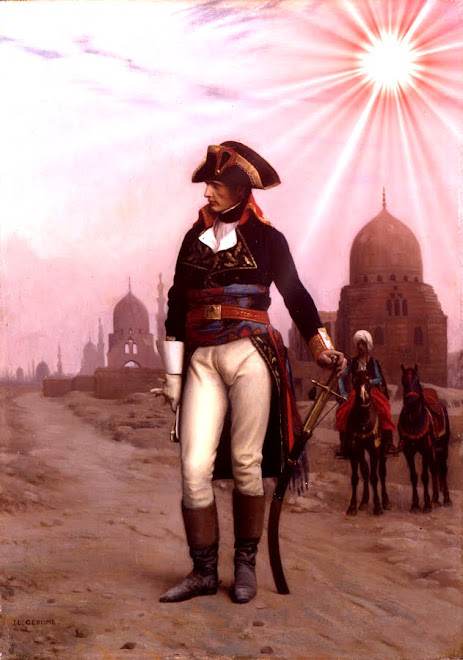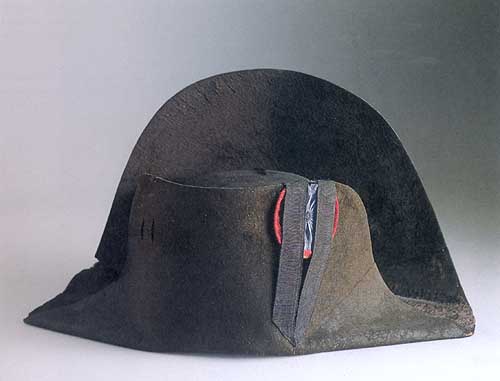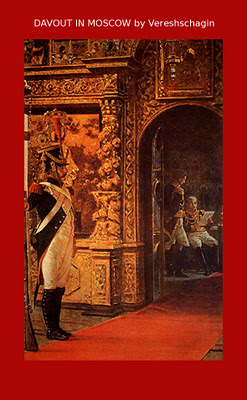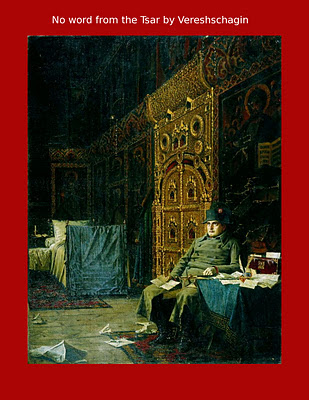NAPOLEON
Although Lefebvre was a Marxist historian writing in 1935-1936, his book is nevertheless the 'Great Man' type of work that the Marxist school were very much against. He wrote while Hitler was in power in Germany and there are conscious and subconscious allusions to the dictator throughout this book. He uses the Nietzschean phrase 'the will to power' several times in reference to Napoleon as if it was simply Napoleon's unbridled ego that led to the many wars of the early C19th. He lays the blame for war squarely at Napoleon's feet.
Few people realize that after Nietzsche died in 1900, his sister Elisabeth gathered together his unfinished notebooks and published them as The Will to Power: Attempt at a Revaluation of all Values. She was feted by the Nazis and told Hitler that her brother would have welcomed him and Nazis philosophy. Nothing could have been further from the truth. Yet the philosopher's views as espoused by his sister, were very much in favour with Hitler and his cronies. This support with such a highly regarded academic background appealed to the dictator's vanity. In return for this endorsement, Elisabeth became a virtual sainted grandmother of the Third Reich. However, she reinterpreted many of Nietzche's ideas and warped his views in order to please her powerful new patron.
Elisabeth inferred that her brother Friedrich would have been a supporter of Hitler's anti-semitism. In fact, Nietzsche ended his friendship with Wagner because of the latter's anti-semitism and spoke of the anti-semite as being the lowliest type of person - the exact opposite of what Elisabeth was saying to Hitler. The Nazi dictator's own philosophy of Social Darwinianism - that the strongest should survive and that the devil could take the hindmost - could be bolstered by the now warped ideas behind the theory of the will to power, hence Hitler made use of it. Thus Nietszche became the so-called 'Philospher of the Third Reich' and has often been unfairly denigrated subsequently because of this.
Hitler persecuted and murdered the Jews - Napoleon gave them equal rights, and freed them from unfair restrictions throughout the territories under his control. And he was the first person to suggest that they should be given a homeland of their own in the Holy Land.
Napoleon was unlike Hitler, Stalin and Mao in other respects. Those three dictators eliminated all opposition. Despite repeated treachery from Talleyrand, Fouche, Bernadotte and many others, Napoleon did not have them executed. Indeed, he even invited Cadoudal - who have been plotting to murder him - to become an officer in his Army. Also, despite innumerable assassination attempts upon his life by D'Artois, the 'legitmate' heir to the vanished Bourbon throne, paid for by English gold, Napoleon did not respond in kind by trying to murder the British monarch.
Lefebvre goes out of his way to blame Napoleon for 'all the wars' and states that the Coalitions against him were only reacting to his plans of conquest - this despite the fact that Napoleon was usually attacked first by the other powers before he crushed them in battle. Neither does Lefebvre mention that after 1805, Napoleon could easily have deposed Francis of Austria; after 1806 he could have deposed Frederick William of Prussia - but he did neither; and after 1807 he could have really put the Tsar in his place - yet Alexander was treated incredibly leniently at Tilsit.
Lefebvre, despite his main Orwellian thesis i.e. 'Napoleon bad - Allies good', then goes on to describe Tsar Alexander's ambitions and empire-building plans and his unsated desire for more and more territory to add to his beloved Russian homeland. ( Long before Alexander, the Russians sent the Second Kamchatka expedition to Alaska from 1733-1743 and soon had vessels trapping sea otters off the Alaskan coast and subsequently down the Pacific Northwest as far south as California.) In fact, Lebevre goes into great detail about the Tsar's plan to attack France in 1811 - the very best and most detailed explanation of Alexander's treachery - when he was supposed to be an ally of Napoleon - I have ever read. This casts Napoleon's invasion of 1812 in a completely new light. In the end, both powers were determined upon war and it was simply a question of who could get their strike in first.
Lefebvre states that Napoleon wanted a quick battle in 1812 and then a new settlement with Alexander to ensure the success of his Continental System. Lefebvre's grasp of the economic, social and cultural aspects of this period in European history is superb - be it about Prussia, Russia, Austria, 'Germany' or even the minor states. His use of detailed records of imports, exports and trade statistics add to the fullest explanation of each powers diplomatic and trading status I have ever come across. His conclusion that England greedily viewed the seas as totally its own domain should come as a surprise to no one. He could have made more of the fact that with its command of the seas, no other power was able to grab as much land and as many colonies as the British, then and subsequently, even outdoing Russia in the end.
Lefebvre's Napoleon is an erudite and scholarly work that still reads like a novel - it is exciting, thought-provoking and stimulating. Certainly five stars.
Copyright 2012 John Tarttelin FINS
A SOULADREAM PRODUCTION









































